国际商法英文试卷
- 格式:docx
- 大小:25.43 KB
- 文档页数:3
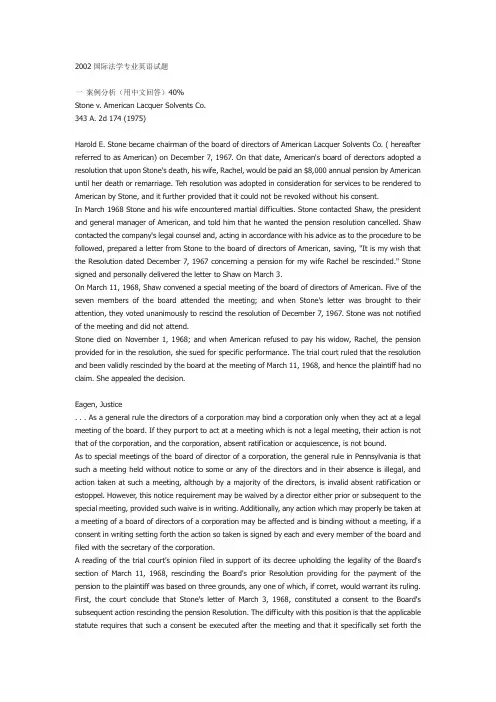
2002国际法学专业英语试题一案例分析(用中文回答)40%Stone v. American Lacquer Solvents Co.343 A. 2d 174 (1975)Harold E. Stone became chairman of the board of directors of American Lacquer Solvents Co. ( hereafter referred to as American) on December 7, 1967. On that date, American's board of derectors adopted a resolution that upon Stone's death, his wife, Rachel, would be paid an $8,000 annual pension by American until her death or remarriage. Teh resolution was adopted in consideration for services to be rendered to American by Stone, and it further provided that it could not be revoked wi t hout his consent.In March 1968 Stone and his wife encountered martial difficulties. Stone contacted Shaw, the president and general manager of American, and told him that he wanted the pension resolution cancelled. Shaw contacted the company's legal counsel and, acting in accordance wi t h his advice as to the procedure to be followed, prepared a letter from Stone to the board of directors of American, saving, "It is my wish that the R esolution dated December 7, 1967 concerning a pension for my wife Rachel be rescinded." Stone signed and personally delivered the letter to Shaw on March 3.On March 11, 1968, Shaw convened a special meeting of the board of directors of American. Five of the seven members of the board attended the meeting; and when Stone's letter was brought to their attention, they voted unanimously to rescind the resolution of December 7, 1967. Stone was not notified of the meeting and did not attend.Stone died on November 1, 1968; and when American refused to pay his widow, Rachel, the pension provided for in the resolution, she sued for specific performance. The trial court ruled that the resolution and been validly rescinded by the board at the meeting of March 11, 1968, and hence the plaintiff had no claim. She appealed the decision.Eagen, Justice. . . As a general rule the directors of a corporation may bind a corporation only when they act at a legal meeting of the board. If they purport to act at a meeting which is not a legal meeting, their action is not that of the corporation, and the corporation, absent ratification or acquiescence, is not bound.As to special meetings of the board of director of a corporation, the general rule in Pennsylvania is that such a meeting held without notice to some or any of the directors and in their absence is illegal, and action taken at such a meeting, although by a majority of the directors, is invalid absent ratification or estoppel. However, this notice requirement may be waived by a director either prior or subsequent to the special meeting, provided such waive is in writing. Addi t ionally, any action which may properly be taken at a meeting of a board of directors of a corporation may be affected and is binding wi t hout a meeting, if a consent in writing setting forth the action so taken is signed by each and every member of the board and filed wi t h the secretary of the corporation.A reading of the trial court's opinion filed in support of i t s decree upholding the legality of the Board's section of March 11, 1968, rescinding the Board's prior Resolution providing for the payment of the pension to the plaintiff was based on three grounds, any one of which, if corret, would warrant its ruling. First, the court conclude that Stone's letter of March 3, 1968, constituted a consent to the Board's subsequent action rescinding the pension Resolution. The difficul t y with this position is that the applicable statute requires that such a consent be executed after the meeting and that i t specifically set forth theaction taken, and that i t be filed with the secretary of the corporation. Stone's letter does not meet these requirements.Secondly, the court conclude [that] Stone's letter of March 3, 1968, consti t uted a waver of receipt of notice of the meeting of March 11, 1968. The difficulty with this position is that the letter does not refer to the meeting or indicatein any way that notice therof is waived. The letter amounts to no more than an expression of desire or consent to rescind the pension Resolution.In connection with its conclusion that Stone's letter constituted a waiver of notice of the meeting, the court reasoned that no purpose would be served by Stone's presence at the meeting since the other Directors were merely acceding to Stone's wishes and request. This analysis overlooks the rational for the salurary rule that all direcors receive notice of special meeting. That rationale is that " each member of a corporate body has the right of consultation with the others, and has the right to be heard upon all questions considered, and i t is presumed that if the absent members had been present they might have dissented, and their arguments might have convinced the majotiry of the unwisdom of their proposed action and thus have produced a different result." We agree with this rationale and, in view of the presumption embodied therein, we cannot concur in the trial court's premise that Stone and other Directors were of one mind as regards the pension rescission. In relation to this, we specifically note that another member of the Board of Directors failed to attend the meeting of March 11, 1968, and there is nothing in the record to show if he received notice of the meeting, or ever consented to the action taken the meeting.Finally, the court concluded that the rescinding resolution of Board was voidable only and that Stone's silence and failure to object thereto prior to hes death amounted to a ratification. The difficul t y with this position is that there is nothing in the record to show that Stone was ever made aware that the meeting of March 11, 1968, had been held or knew the rescinding resolution had been adopted by the Board. Under the circumstances, i t cannot be said a ratification was effected...[R]eversed and ... remanded for further proceeding...思考题:1.请以时间顺序为线索陈述本案基本事实。
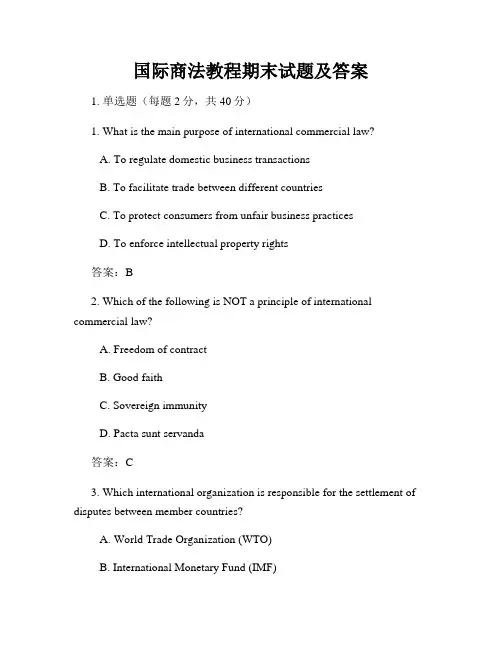
国际商法教程期末试题及答案1. 单选题(每题2分,共40分)1. What is the main purpose of international commercial law?A. To regulate domestic business transactionsB. To facilitate trade between different countriesC. To protect consumers from unfair business practicesD. To enforce intellectual property rights答案:B2. Which of the following is NOT a principle of international commercial law?A. Freedom of contractB. Good faithC. Sovereign immunityD. Pacta sunt servanda答案:C3. Which international organization is responsible for the settlement of disputes between member countries?A. World Trade Organization (WTO)B. International Monetary Fund (IMF)C. United Nations (UN)D. International Court of Justice (ICJ)答案:A4. What is the purpose of the United Nations Convention on Contracts for the International Sale of Goods (CISG)?A. To harmonize contract law in different countriesB. To establish a global court for contract disputesC. To regulate the sale of goods within a specific regionD. To protect consumers from fraudulent sellers答案:A5. Which of the following is NOT a method of dispute resolution in international commercial law?A. MediationB. ArbitrationC. LitigationD. Negotiation答案:D...(继续回答6-40题)2. 客观题(每题5分,共50分)1. Define the principle of "lex mercatoria" in international commercial law.答案:Lex mercatoria refers to the body of customary rules and practices that have developed in international trade. It is based on the principles of fairness, good faith, and commercial reasonableness.2. Explain the concept of "force majeure" and its role in international contracts.答案:Force majeure refers to unforeseen circumstances or events beyond the control of the parties that make it impossible to fulfill their contractual obligations. It is often included as a clause in international contracts to excuse performance in such circumstances.3. Discuss the significance of the "most favored nation" principle in international trade.答案:The most favored nation principle requires that any favorable treatment given to one country must be extended to all other countries. It promotes equal treatment and prevents discrimination in international trade.4. Explain the difference between common law and civil law systems and their influence on international commercial law.答案:Common law systems are based on judicial precedents and case law, while civil law systems rely on codified statutes and legal codes. These two systems have different approaches to contract interpretation and dispute resolution, which can impact the application of international commercial law.5. What is the role of the International Chamber of Commerce (ICC) in international commercial law?答案:The ICC plays a significant role in the development and promotion of international commercial law. It provides standardized model contracts, rules for arbitration, and other resources to facilitate trade and resolve disputes....(继续回答6-10题)3. 论述题(每题20分,共60分)1. Discuss the importance of choice of law clauses in international contracts.答案:Choice of law clauses are essential in international contracts as they determine which jurisdiction's laws will govern the interpretation and enforcement of the contract. This helps ensure legal certainty and predictability, especially when parties involved are from different countries with different legal systems. By choosing the applicable law in advance, parties can better understand their rights and obligations under the contract and avoid potential conflicts or misunderstandings. It also provides a clear framework for resolving disputes that may arise during the course of the contract. However, it is crucial for parties to carefully consider the choice of law and seek legal advice to ensure it aligns with their interests and objectives.2. Analyze the benefits and challenges of international arbitration as a method of dispute resolution in international commercial law.答案:International arbitration offers several advantages as a method of dispute resolution in international commercial law. Firstly, it provides a neutral and private forum that allows parties to resolve their disputes outside of national courts, which can be advantageous when dealing with cross-border transactions. The use of arbitration can help avoid potential biases or preferences towards domestic parties. Secondly, it offers flexibility in terms of procedural rules, language, and choice of arbitrators. Parties can select arbitrators with expertise in the subject matter of the dispute, thus ensuring a fair and knowledgeable decision-making process. Thirdly, arbitral awards are generally enforceable across countries through international conventions such as the New York Convention, which enhances the enforceability and finality of arbitration decisions.However, international arbitration also presents challenges. It can be expensive, especially when parties need to hire specialized legal counsel and arbitrators. The lack of a formal appeals process can raise concerns about limited options for challenging an unfavorable award. Furthermore, cultural and procedural differences between parties involved from different jurisdictions can impact the efficiency and fairness of the arbitration proceedings. Despite these challenges, international arbitration remains a popular choice for resolving disputes in international commercial law due to its many advantages.3. Discuss the role of the World Trade Organization (WTO) in regulating international trade and resolving trade disputes.答案:The World Trade Organization (WTO) plays a crucial role in regulating international trade and resolving trade disputes among membercountries. Its primary objectives include facilitating the smooth flow of trade, promoting fair competition, and ensuring that trade policies are transparent and predictable. The WTO provides a framework for negotiating and enforcing trade agreements, such as the General Agreement on Tariffs and Trade (GATT) and various sector-specific agreements.One of the key functions of the WTO is dispute settlement. It offers a multilateral and binding dispute resolution mechanism that helps member countries resolve trade disputes in a fair and impartial manner. The WTO Dispute Settlement Body (DSB) consists of independent panels that hear and adjudicate trade disputes brought by member countries. The DSB's decisions are binding, and non-compliance can result in authorized retaliation or the imposition of trade sanctions.The WTO's dispute settlement mechanism has contributed to the resolution of numerous trade disputes, promoting stability and predictability in international trade. It has played a significant role in reducing trade barriers and ensuring compliance with agreed-upon trade rules. However, some criticisms include the length and complexity of the dispute settlement process, concerns about the influence of powerful countries, and the limited participation of developing countries in the decision-making process.Despite these challenges, the WTO remains an important institution for the regulation and resolution of international trade disputes. It continues to work towards a more inclusive and balanced international trading system....(继续回答4-6论述题)总结:本文针对国际商法教程期末试题及答案展开了详细的回答。
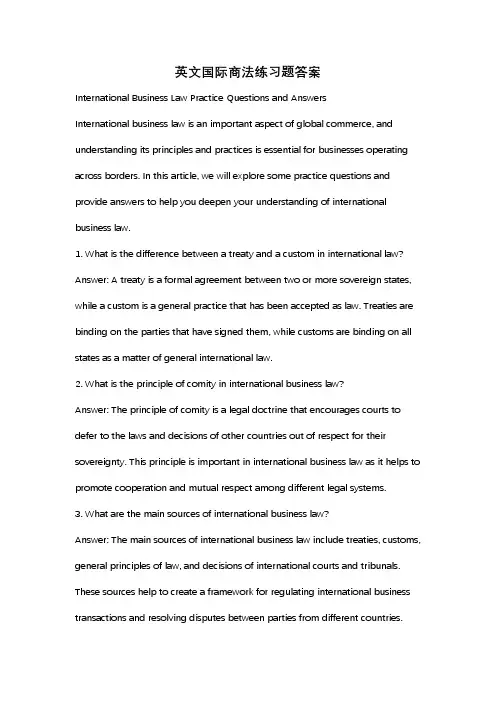
英文国际商法练习题答案International Business Law Practice Questions and AnswersInternational business law is an important aspect of global commerce, and understanding its principles and practices is essential for businesses operating across borders. In this article, we will explore some practice questions and provide answers to help you deepen your understanding of international business law.1. What is the difference between a treaty and a custom in international law? Answer: A treaty is a formal agreement between two or more sovereign states, while a custom is a general practice that has been accepted as law. Treaties are binding on the parties that have signed them, while customs are binding on all states as a matter of general international law.2. What is the principle of comity in international business law?Answer: The principle of comity is a legal doctrine that encourages courts to defer to the laws and decisions of other countries out of respect for their sovereignty. This principle is important in international business law as it helps to promote cooperation and mutual respect among different legal systems.3. What are the main sources of international business law?Answer: The main sources of international business law include treaties, customs, general principles of law, and decisions of international courts and tribunals. These sources help to create a framework for regulating international business transactions and resolving disputes between parties from different countries.4. How does the principle of forum non conveniens apply in international business law?Answer: The principle of forum non conveniens allows a court to decline jurisdiction over a case if it determines that another forum would be more appropriate for resolving the dispute. This principle is often invoked in international business law cases where the parties are from different countries and there are competing interests in different legal systems.5. What is the role of the International Chamber of Commerce (ICC) in international business law?Answer: The ICC is a global business organization that provides a forum for businesses and governments to discuss and develop international business law and practices. It also administers the ICC International Court of Arbitration, which is a leading institution for the resolution of international commercial disputes.In conclusion, international business law is a complex and dynamic field that requires a deep understanding of its principles and practices. By exploring practice questions and answers like the ones provided in this article, businesses can gain valuable insights into the legal framework that governs their international transactions and relationships.。
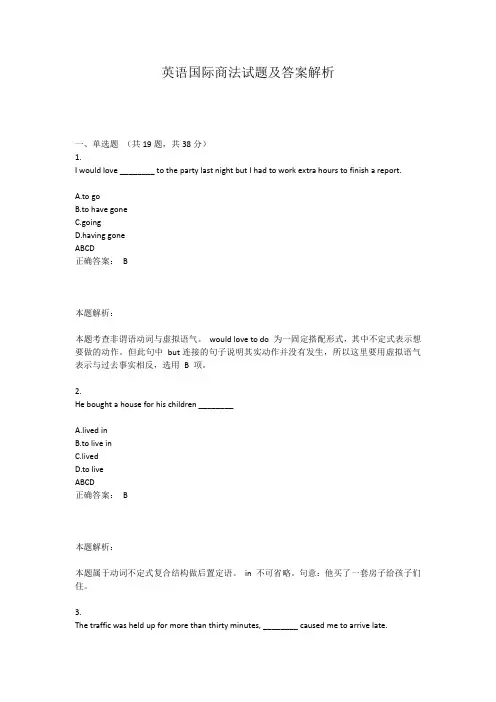
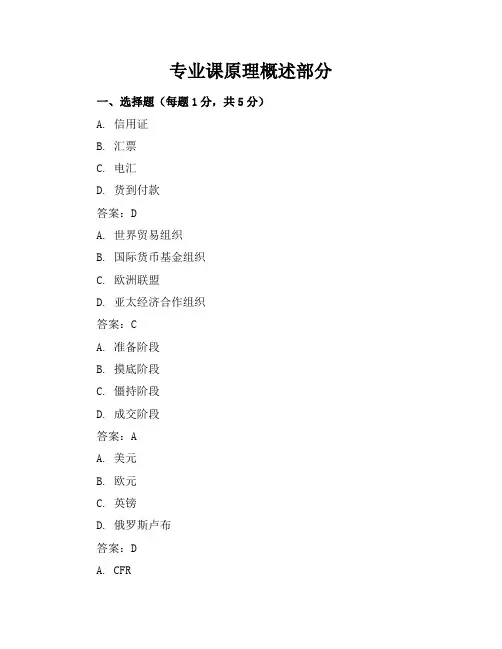
专业课原理概述部分一、选择题(每题1分,共5分)A. 信用证B. 汇票C. 电汇D. 货到付款答案:DA. 世界贸易组织B. 国际货币基金组织C. 欧洲联盟D. 亚太经济合作组织答案:CA. 准备阶段B. 摸底阶段C. 僵持阶段D. 成交阶段答案:AA. 美元B. 欧元C. 英镑D. 俄罗斯卢布答案:DA. CFRB. CIFC. FOBD. DDP答案:A二、判断题(每题1分,共5分)1. 国际商务合同中,卖方负责办理出口手续。
(√)2. 在国际商务活动中,信用证是一种无条件的支付承诺。
(×)3. 国际商务谈判中,文化差异对谈判结果没有影响。
(×)4. 国际货币基金组织的宗旨是促进国际货币领域的合作。
(√)5. 国际商务活动中,关税壁垒是唯一一种限制进口的手段。
(×)三、填空题(每题1分,共5分)1. 国际商务活动中,以信用证方式支付货款时,银行承担的是______(第一性)付款责任。
2. 世界贸易组织的基本原则包括非歧视原则、______(最惠国待遇)原则和透明度原则。
3. 在国际商务谈判中,______(利益)是谈判双方关注的焦点。
4. 国际商务活动中,跨国公司通过______(直接投资)方式进入国外市场。
5. 国际商务合同中,______(仲裁)是解决合同争议的一种方式。
四、简答题(每题2分,共10分)1. 简述国际商务活动中信用证的作用。
答案:信用证是一种银行信用,为买卖双方提供信用保障,降低交易风险;有利于买卖双方解决交易中的信任问题;有利于买卖双方融资。
2. 简述跨国公司的组织结构类型。
答案:跨国公司的组织结构类型包括母子结构、兄弟结构、区域结构和全球产品结构。
3. 简述国际商务谈判中的文化差异对谈判的影响。
答案:文化差异影响谈判双方的语言沟通、非语言沟通、价值观、谈判风格和信任建立。
4. 简述国际货币基金组织的职能。
答案:国际货币基金组织的主要职能包括监督国际货币体系和汇率政策、提供技术援助和培训、为成员国提供资金支持。
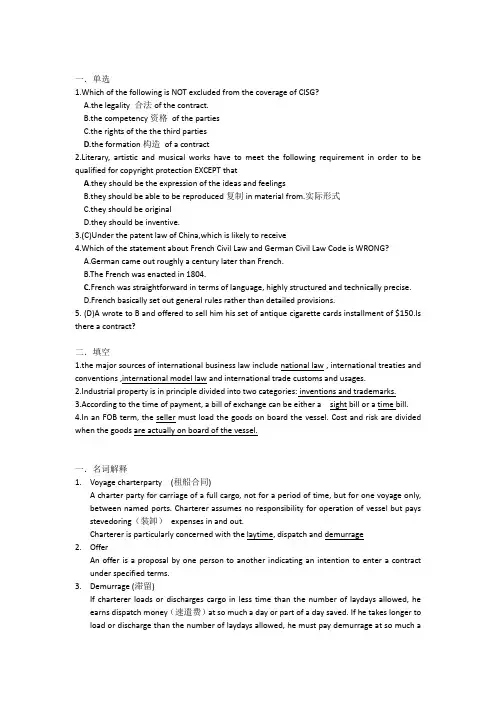
一.单选1.Which of the following is NOT excluded from the coverage of CISG?A.the legality 合法of the contract.B.the competency资格of the partiesC.the rights of the the third partiesD.the formation构造of a contract2.Literary, artistic and musical works have to meet the following requirement in order to be qualified for copyright protection EXCEPT thatA.they should be the expression of the ideas and feelingsB.they should be able to be reproduced复制in material from.实际形式C.they should be originalD.they should be inventive.3.(C)Under the patent law of China,which is likely to receive4.Which of the statement about French Civil Law and German Civil Law Code is WRONG?A.German came out roughly a century later than French.B.The French was enacted in 1804.C.French was straightforward in terms of language, highly structured and technically precise.D.French basically set out general rules rather than detailed provisions.5. (D)A wrote to B and offered to sell him his set of antique cigarette cards installment of $150.Is there a contract?二.填空1.the major sources of international business law include national law , international treaties and conventions ,international model law and international trade customs and usages.2.Industrial property is in principle divided into two categories: inventions and trademarks.3.According to the time of payment, a bill of exchange can be either a sight bill or a time bill.4.In an FOB term, the seller must load the goods on board the vessel. Cost and risk are divided when the goods are actually on board of the vessel.一.名词解释1.Voyage charterparty (租船合同)A charter party for carriage of a full cargo, not for a period of time, but for one voyage only,between named ports. Charterer assumes no responsibility for operation of vessel but pays stevedoring(装卸)expenses in and out.Charterer is particularly concerned with the laytime, dispatch and demurrage2.OfferAn offer is a proposal by one person to another indicating an intention to enter a contract under specified terms.3.Demurrage (滞留)If charterer loads or discharges cargo in less time than the number of laydays allowed, he earns dispatch money(速遣费)at so much a day or part of a day saved. If he takes longer to load or discharge than the number of laydays allowed, he must pay demurrage at so much aday.二.翻译1.Article 101. An annual session of the shareholders’ assembly shall be held each year. Under any of the following circumstance, an interim shareholders’ assembly session shall be held within 2 months:年度股东大会必须每年都要召开,在以下任意一种情况下,临时股东大会必须在两个月内召开:(1)The number of directors is less than two-thirds of the number of directors as requiredby this Law or the number of directors as specified in the bylaw(细则).董事人数少于法律所规定的董事人数的2/3或细则中所规定的董事人数。
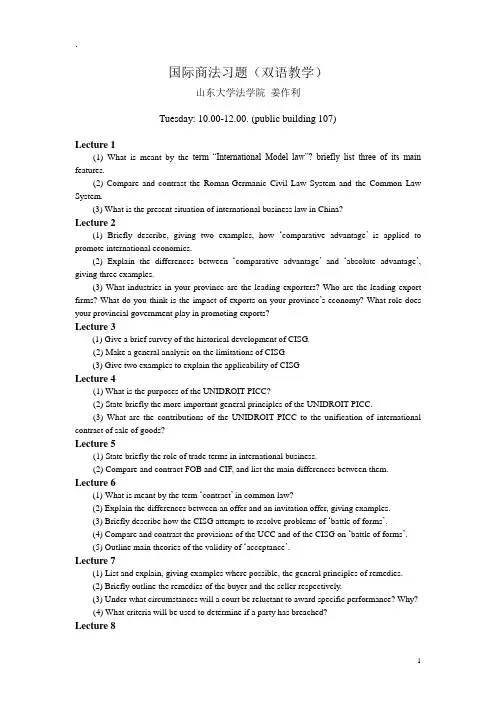
国际商法习题(双语教学)山东大学法学院姜作利Tuesday: 10.00-12.00. (public building 107)Lecture 1(1) What is meant by the term “International Model law”? briefly list three of its main features.(2) Compare and contrast the Roman-Germanic Civil Law System and the Common Law System.(3) What is the present situation of international business law in China?Lecture 2(1) Briefly describe, giving two examples, how ‘comparative advantage’is applied to promote international economics.(2) Explain the differences between ‘comparative advantage’and ‘absolute advantage’, giving three examples.(3) What industries in your province are the leading exporters? Who are the leading export firms? What do you think is the impact of exports on your province’s economy? What role does your provincial government play in promoting exports?Lecture 3(1) Give a brief survey of the historical development of CISG.(2) Make a general analysis on the limitations of CISG.(3) Give two examples to explain the applicability of CISGLecture 4(1) What is the purposes of the UNIDROIT PICC?(2) State briefly the more important general principles of the UNIDROIT PICC.(3) What are the contributions of the UNIDROIT PICC to the unification of international contract of sale of goods?Lecture 5(1) State briefly the role of trade terms in international business.(2) Compare and contract FOB and CIF, and list the main differences between them. Lecture 6(1)What is meant by the term ‘contract’ in common law?(2) Explain the differences between an offer and an invitation offer, giving examples.(3) Briefly describe how the CISG attempts to resolve problems of ‘battle of forms’.(4) Compare and contrast the provisions of the UCC and of the CISG on ‘battle of forms’.(5) Outline main theories of the validity of ‘acceptance’.Lecture 7(1) List and explain, giving examples where possible, the general principles of remedies.(2) Briefly outline the remedies of the buyer and the seller respectively.(3) Under what circumstances will a court be reluctant to award specific performance? Why?(4) What criteria will be used to determine if a party has breached?Lecture 8(1) Explain briefly anticipatory breach of contract(2) Make a concise comparison between anticipatory breach of contract and exceptio non adimpleti contractus in civil law.(3) State briefly the liquidated damages, giving one example.Lecture 9(1) What is the seller’s obligation to deliver the goods under CISG?(2) How is seller’s assurance of quality of the goods stipulated under UCC?(3) Explain the rules of ‘passing of risk’ under the CISG, giving examples.Lecture 10(1) Make an analysis on the justification of excuses of non-performance.(2) Compare and contrast the ‘excuses for non-performance’ systems of the common law and civil law.(3) Compare the theory of excuses of non-performance and the principle of favor contractus. Lecture 11(1) Define ‘a standby letter of credit’ and identify the circumstances where it can be used in international trade practices.(2) Explain, giving examples where possible, the principle of independence and the rule of strict compliance.(3) Outline and discuss the causes of fraud in letter of credit and state the rationality of doctrine of fraud exception.Lecture 12(1) State briefly the historical development of international factoring.(2) Discuss the advantages and disadvantages of international factoring to Chinese merchants.Lecture 13(1) Why is it important to determine whether an agent is acting with authority? In your answer, use at lease one case reference and give an explanation of the difference between actual and apparent authority.(2) Explain the main ways in which an agency can be ratified, giving two examples.(3) Explain briefly the circumstances that would cause an agent to be liable to the party meant to be contracting with the principal.(4) List and explain the duties of the principal and/or agent, giving examples where possible. Lecture 14(1) Define jurisdiction and venue, giving at least two examples.(2) Explain minimum contacts. What applications do they have in international disputes?(3) Compare and contrast ‘negotiation’, ‘mediation’and ‘mini-trial’and list their advantages respectively.Lecture 15(1) What are the risks associated with and advantages of arbitration? Give two examples.(2) How would a choice of law clause and a clause clearly delineating the power of the arbitrator help to address some of a party’s concerns?(3) List and explain the doctrines of choice of procedure and substantive law, giving at least three examples.(4) Describe briefly the scope of an arbitration agreement.。
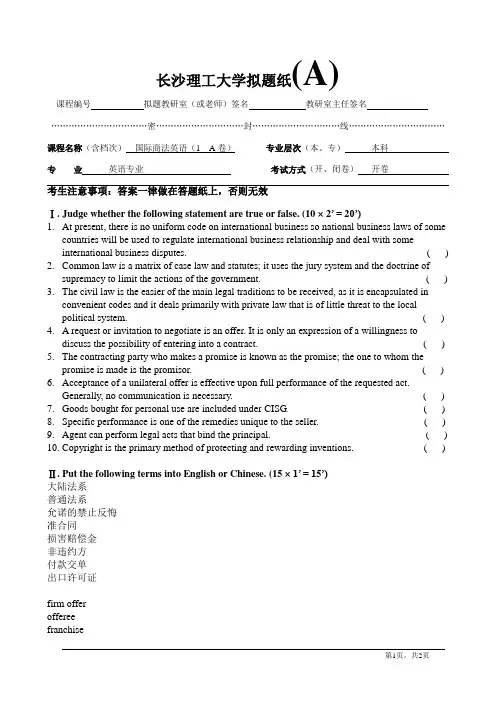
长沙理工大学拟题纸(A)课程编号拟题教研室(或老师)签名教研室主任签名……………………………密…………………………封…………………………线……………………………课程名称(含档次)国际商法英语(1---A卷)专业层次(本、专)本科专业英语专业考试方式(开、闭卷)开卷考生注意事项:答案一律做在答题纸上,否则无效Ⅰ. Judge whether the following statement are true or false. (10 × 2’ = 20’)1.At present, there is no uniform code on international business so national business laws of somecountries will be used to regulate international business relationship and deal with someinternational business disputes. ( ) mon law is a matrix of case law and statutes; it uses the jury system and the doctrine ofsupremacy to limit the actions of the government. ( ) 3.The civil law is the easier of the main legal traditions to be received, as it is encapsulated inconvenient codes and it deals primarily with private law that is of little threat to the localpolitical system. ( ) 4. A request or invitation to negotiate is an offer. It is only an expression of a willingness todiscuss the possibility of entering into a contract. ( ) 5.The contracting party who makes a promise is known as the promise; the one to whom thepromise is made is the promisor. ( ) 6.Acceptance of a unilateral offer is effective upon full performance of the requested act.Generally, no communication is necessary. ( )7.Goods bought for personal use are included under CISG. ( )8.Specific performance is one of the remedies unique to the seller. ( )9.Agent can perform legal acts that bind the principal. ( )10.Copyright is the primary method of protecting and rewarding inventions. ( ) Ⅱ. Put the following terms into English or Chinese. (15 ×1’ = 15’)大陆法系普通法系允诺的禁止反悔准合同损害赔偿金非违约方付款交单出口许可证firm offeroffereefranchisemost-favored-nation treatmentrestrictive trade barriersDispute Settlement Systempublic companyⅢ. Giving brief definitions of the following terms. (5 × 3’ = 15’)1.precedent2.consideration3.specific performance4.service mark5.trade secretsⅣ. Answer the following questions. (5 × 4’ = 20’)1.Consider the layout of an integrated circuit, which is copyrightable, the drawing of the circuit orthe actual circuit? Why?2.How many ways are there to terminate an offer?3.What are the duties of issuing bank in a L/C transaction?4.What are the functions of B/L in international transactions?5.What are the main international treaties dealing with patents?Ⅴ. Case analysis (3× 10’= 30’)1.Johnson took his daughter to Mike, a doctor, and asked Mike to operate on the daughter’s hand,which had been scarred in an accident. Mike said the girl would be in the hospital for three or four days and that the hand would probably deal within a few days. The hand became infected, and daughter was hospitalized for three months.Did the father win a suit for breach of a contract?2.Your contract with Sheikh Enterprises to sell it you office-equipment business under aninstallment sales contract requiring 12 monthly payment. Sheikh Enterprisers decides not to buy the business but knows of another party, A & N Corporation, interested in doing so. All three of you get together and agree to a new contract under which A & N Corporation agrees to purchase your business. Is the original contract discharged and replaced with the new contract?3.Bruce is hired as a booking agent for a rock group, the Crash, as the group’s agent. Bruce cannegotiate contracts for the rock group to appear at concerts. Are the contracts binding and legally enforceable against the group?。
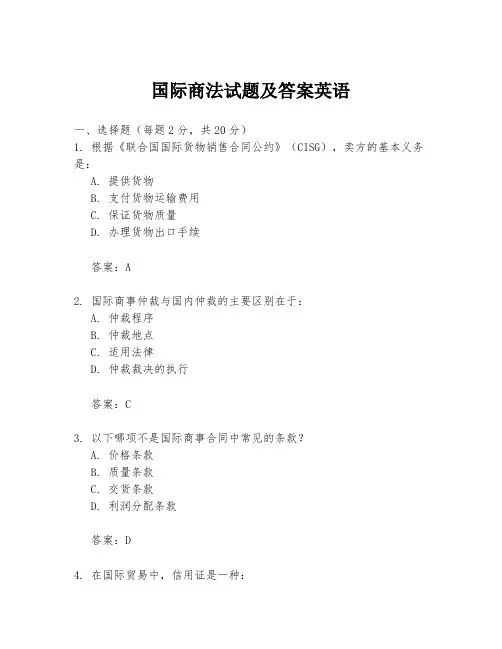
国际商法试题及答案英语一、选择题(每题2分,共20分)1. 根据《联合国国际货物销售合同公约》(CISG),卖方的基本义务是:A. 提供货物B. 支付货物运输费用C. 保证货物质量D. 办理货物出口手续答案:A2. 国际商事仲裁与国内仲裁的主要区别在于:A. 仲裁程序B. 仲裁地点C. 适用法律D. 仲裁裁决的执行答案:C3. 以下哪项不是国际商事合同中常见的条款?A. 价格条款B. 质量条款C. 交货条款D. 利润分配条款答案:D4. 在国际贸易中,信用证是一种:A. 支付方式B. 保险单C. 运输文件D. 合同答案:A5. 根据国际贸易术语解释通则(Incoterms),FOB(Free On Board)条款下,卖方的责任是:A. 货物运输到买方指定的港口B. 货物装上船并承担所有费用C. 货物装上船并承担运输费用D. 货物装上船并承担货物运输费用答案:B6. 国际商事合同的解除通常基于:A. 合同双方的同意B. 合同一方的违约C. 合同一方的破产D. 合同一方的死亡答案:B7. 国际商事合同中,不可抗力条款的主要作用是:A. 规定合同的解除条件B. 规定合同的履行期限C. 规定合同的违约责任D. 规定合同的支付方式答案:A8. 在国际贸易中,代理关系中代理人的义务包括:A. 代表委托人签订合同B. 代表委托人支付货款C. 代表委托人承担违约责任D. 代表委托人进行诉讼答案:A9. 国际商事合同中,最常用的解决争议的方式是:A. 诉讼B. 仲裁C. 调解D. 协商答案:B10. 国际商事合同中,保证条款通常用于:A. 确保合同的履行B. 确保合同的保密性C. 确保合同的合法性D. 确保合同的可执行性答案:A二、简答题(每题10分,共20分)1. 简述国际商事合同中的风险转移原则。
答案:风险转移原则是指在国际货物销售合同中,货物的风险从卖方转移到买方的时间点。
根据CISG第66条,风险转移通常与货物的交付同时发生。
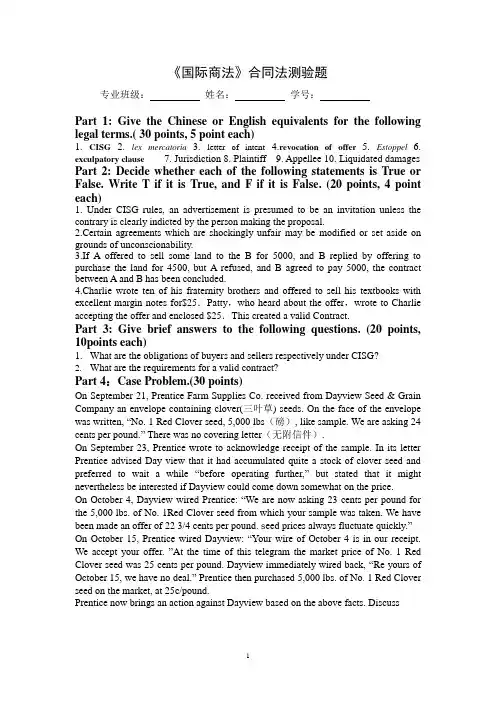
《国际商法》合同法测验题专业班级:姓名:学号:Part 1: Give the Chinese or English equivalents for the following legal terms.( 30 points, 5 point each)1. CISG2. lex mercatoria3. letter of intent4.revocation of offer5. Estoppel6. exculpatory clause7. Jurisdiction8. Plaintiff9. Appellee 10. Liquidated damages Part 2: Decide whether each of the following statements is True or False. Write T if it is True, and F if it is False. (20 points, 4 point each)1. Under CISG rules, an advertisement is presumed to be an invitation unless the contrary is clearly indicted by the person making the proposal.2.Certain agreements which are shockingly unfair may be modified or set aside on grounds of unconscionability.3.If A offered to sell some land to the B for 5000, and B replied by offering to purchase the land for 4500, but A refused, and B agreed to pay 5000, the contract between A and B has been concluded.4.Charlie wrote ten of his fraternity brothers and offered to sell his textbooks with excellent margin notes for$25.Patty,who heard about the offer,wrote to Charlie accepting the offer and enclosed $25.This created a valid Contract.Part 3: Give brief answers to the following questions. (20 points, 10points each)1.What are the obligations of buyers and sellers respectively under CISG?2.What are the requirements for a valid contract?Part 4:Case Problem.(30 points)On September 21, Prentice Farm Supplies Co. received from Dayview Seed & Grain Company an envelope containing clover(三叶草) seeds. On the face of the envelope was written, “No. 1 Red Clover seed, 5,000 lbs(磅), like sample. We are asking 24 cents per pound.” There was no covering letter(无附信件).On September 23, Prentice wrote to acknowledge receipt of the sample. In its letter Prentice advised Day view that it had accumulated quite a stock of clover seed and preferred to wait a while “before operating further,”but stated that it might nevertheless be interested if Dayview could come down somewhat on the price.On October 4, Dayview wired Prentice: “We are now asking 23 cents per pound for the 5,000 lbs. of No. 1Red Clover seed from which your sample was taken. We have been made an offer of 22 3/4 cents per pound. s eed prices always fluctuate quickly.”On October 15, Prentice wired Dayview: “Your wire of October 4 is in our receipt. We accept your offer. ”At the time of this telegram the market price of No. 1 Red Clover seed was 25 cents per pound. Dayview immediately wired back, “Re yours of October 15, we have no deal.” Prentice then purchased 5,000 lbs. of No. 1 Red Clover seed on the market, at 25c/pound.Prentice now brings an action against Dayview based on the above facts. Discuss1。
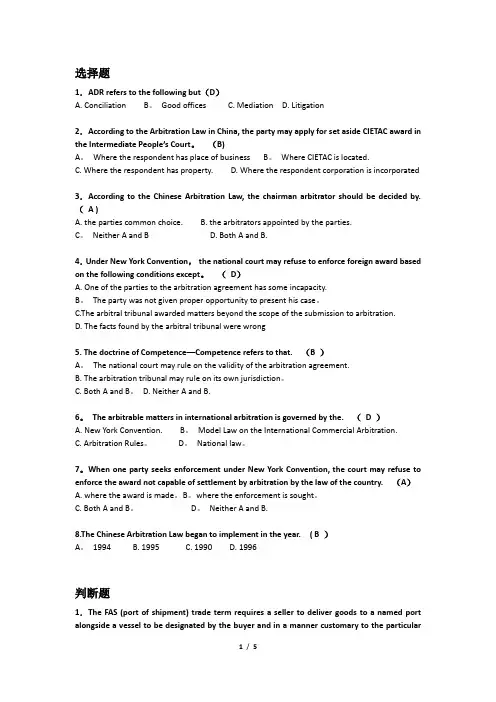
选择题1.ADR refers to the following but(D)A. Conciliation B。
Good offices C. Mediation D. Litigation2.According to the Arbitration Law in China, the party may apply for set aside CIETAC award in the Intermediate People’s Court。
(B)A。
Where the respondent has place of business B。
Where CIETAC is located.C. Where the respondent has property.D. Where the respondent corporation is incorporated3.According to the Chinese Arbitration Law, the chairman arbitrator should be decided by. ( A )A. the parties common choice.B. the arbitrators appointed by the parties.C。
Neither A and B D. Both A and B.4.Under New York Convention,the national court may refuse to enforce foreign award based on the following conditions except。
(D)A. One of the parties to the arbitration agreement has some incapacity.B。
The party was not given proper opportunity to present his case。
国际商法英语试题及答案一、选择题(每题2分,共20分)1. Which of the following is not a characteristic of international trade law?A. UniversalityB. VoluntarinessC. FlexibilityD. Inflexibility答案:D2. The principle of "freedom of contract" in international trade primarily means:A. The parties are free to choose the applicable law.B. The parties are free to choose the form of the contract.C. The parties are free to determine the content of the contract.D. The parties are free to decide the place of performance. 答案:C3. In international trade, which of the following is not considered a documentary credit instrument?A. Letter of creditB. Bill of exchangeC. Promissory noteD. Draft答案:C4. The Incoterms rules are used to:A. Define the obligations of the seller and the buyer.B. Determine the applicable law.C. Calculate the customs duties.D. Regulate the payment of interest.答案:A5. Which of the following is not a method of international payment?A. Cash in advanceB. Documentary collectionC. ConsignmentD. Barter答案:C6. The Vienna Convention on Contracts for the International Sale of Goods applies to contracts:A. Concluded in writing.B. Governed by the law of a contracting state.C. For the sale of goods between enterprises.D. Involving the sale of goods across international borders. 答案:D7. The United Nations Convention on Contracts for the International Sale of Goods (CISG) is applicable to:A. All international sales contracts.B. Sales contracts between parties from different countries.C. Sales contracts that explicitly choose the CISG.D. Sales contracts that involve the transfer of tangible goods.答案:D8. In international trade, the term "Force Majeure" refers to:A. A party's failure to perform due to unforeseen circumstances.B. A party's intentional breach of contract.C. A party's refusal to perform due to a change in market conditions.D. A party's performance being delayed due to a strike.答案:A9. The "Ex Works" term in Incoterms means that the seller:A. Bears all costs and risks until the goods are delivered.B. Is responsible for loading the goods on board the vessel.C. Delivers the goods at their premises, cleared for export.D. Delivers the goods to the carrier nominated by the buyer.答案:C10. The "Cost, Insurance and Freight" (CIF) term in Incoterms requires the seller to:A. Pay for the goods only.B. Pay for the goods and the freight to the destination.C. Pay for the goods, freight, and insurance to the destination.D. Pay for the goods and insurance only.答案:C二、填空题(每题2分,共20分)1. The ________ Convention on Contracts for the International Sale of Goods is a widely accepted international treaty that provides a uniform set of rules for the sale of goods between parties from different countries.答案:United Nations2. The ________ principle in international trade law allows parties to a contract to choose the law that will governtheir contract.答案:party autonomy3. In international trade, a ________ is a written order issued by a bank on behalf of a buyer, directing the bank to pay the seller upon presentation of specified documents.答案:letter of credit4. The ________ rule in international trade law states that a contract is not valid unless it is in writing and signed by the parties.答案:statute of frauds5. The ________ is a set of international rules that define the responsibilities of sellers and buyers for the delivery of goods under international sales contracts.答案:Incoterms6. The ________ is a method of payment in international trade where the buyer pays the seller in advance of the goods being shipped.答案:cash in advance7. A ________ is a document that serves as evidence of the terms of a contract for the sale of goods, and it is often used in international trade to facilitate the payment process. 答案:bill of lading8. The ________ is a legal doctrine that allows a party to be released from liability or to claim damages when an event beyond their control prevents them from fulfilling a contract. 答案:force majeure9. The ________ term in Incoterms means that the seller is responsible for all costs and risks involved in bringing the goods to the port of destination.答案:Delivered at Terminal (DAT)10. The ________ is a method of international payment wherethe seller ships the goods to the buyer and transfers the documents of title, but the payment is not made until the buyer has inspected and accepted the goods.答案:documentary collection。
国际商务英语试题及答案一、选择题(每题2分,共20分)1. The term "FOB" in international trade refers to:A. Free on BoardB. Free of BoardC. Full of BoardD. Final on Board答案:A2. Which of the following is not a document required for exporting goods?A. Commercial InvoiceB. Packing ListC. Certificate of OriginD. Birth Certificate答案:D3. In international business, what does "T/T" stand for?A. Trust TransferB. Telex TransferC. Transfer TrustD. Telegraphic Transfer答案:D4. The most common method of payment in international trade is:A. Cash in AdvanceB. Letter of CreditC. ConsignmentD. Countertrade答案:B5. What is the meaning of "CIF" in international trade terms?A. Cost, Insurance, and FreightB. Cost, Insurance, and Freight to DestinationC. Cost, Insurance, Freight, and CommissionD. Cost, Insurance, Freight, and Taxes答案:A6. Which of the following is not a function of a commercial bank in international business?A. Letter of Credit IssuanceB. Foreign Exchange ServicesC. Insurance ServicesD. Documentary Collections答案:C7. The Incoterms rule that requires the seller to arrange for carriage but not insurance is:A. FOBB. CFRC. CIFD. CIP答案:B8. What is the abbreviation for "World Trade Organization"?A. WTOB. WBOC. WTOOD. WOT答案:A9. In international trade, the term "D/P" stands for:A. Documents against PaymentB. Direct PaymentC. Direct PurchaseD. Deferred Payment答案:A10. The document that proves the ownership of goods being transported is:A. Bill of LadingB. Air WaybillC. Sea WaybillD. Railway Bill答案:A二、填空题(每题2分,共20分)1. The ________ is an international treaty that governs the rules of international trade.答案:GATT2. When goods are sold on a ________ basis, the seller retains the title until payment is made.答案:Consignment3. The ________ is a type of documentary credit that allows the seller to draw the money before shipment.答案:Usance Letter of Credit4. In international trade, the ________ is the document that proves the goods have been loaded on board the vessel.答案:Bill of Lading5. The ________ is a document that lists the contents and details of each package in a shipment.答案:Packing List6. The ________ is a document that provides information about the origin of the goods.答案:Certificate of Origin7. The ________ is a document that shows the terms and conditions of a sale.答案:Sales Contract8. The ________ is a document that provides proof of insurance coverage for the goods being transported.答案:Insurance Policy9. The ________ is a document that lists the goods and their quantities, weights, and measures.答案:Manifest10. The ________ is a document that provides a summary of the financial transactions between the buyer and seller.答案:Statement of Accounts三、简答题(每题10分,共40分)1. Explain the difference between a "Proforma Invoice" and a "Commercial Invoice".答案:A Proforma Invoice is a document that serves as a preliminary invoice providing details about the shipment andis often used for customs purposes or as a reference for the buyer. A Commercial Invoice, on the other hand, is a legally binding document that outlines the terms of sale, includingthe price, quantity, and description of goods, and is usedfor customs clearance and payment purposes.2. What are the advantages and disadvantages of using aLetter of Credit in international trade?答案:Advantages include security for both the buyer and seller, as the payment is guaranteed by a bank, and itprovides a framework for the transaction. Disadvantagesinclude the cost of the bank fees, potential delays due to documentation issues, and the complexity of the process.3. Describe the process of a Documentary Collection in international trade.答案:In a Documentary Collection, the exporter ships the goods and submits the required documents to their bank, which then forwards them to the importer's bank. The importer'sbank releases the documents to the importer upon payment (D/P) or acceptance of a time draft (D/A).4. What is the role of a freight forwarder in international trade?答案:A freight forwarder acts as an intermediary between the exporter and various transportation services, arranging forthe transportation of goods, preparing necessary documents,。
英文国际商法练习题答案一、选择题1. 国际商法中,合同的成立需要满足哪些条件?A. 要约和承诺B. 双方当事人的同意C. 明确的权利和义务D. 所有上述条件答案:D2. 根据《联合国国际货物销售合同公约》(CISG),卖方的基本义务是什么?A. 交付货物B. 转移货物所有权C. 提供货物运输文件D. 交付货物并转移所有权答案:D3. 在国际贸易中,信用证是一种什么样的支付工具?A. 无条件的支付保证B. 有条件的支付保证C. 一种保险形式D. 一种贷款形式答案:B4. 什么是FOB(Free On Board)条款?A. 卖方负责货物运输到买方指定的港口B. 买方负责货物运输到卖方指定的港口C. 卖方在货物上船后不再承担任何责任D. 买方在货物上船后立即承担所有责任答案:C5. 什么是不可抗力条款?A. 允许一方在对方违约时解除合同的条款B. 允许一方在遇到不可预见事件时解除合同的条款C. 规定合同期限的条款D. 规定合同价格的条款答案:B二、简答题1. 简述国际商法与国内商法的主要区别。
答案:国际商法主要涉及跨国界的商业交易,其法律适用往往需要考虑不同国家的法律体系和国际公约。
而国内商法则主要适用于单一国家的商业交易,其法律适用相对单一,通常遵循该国的法律体系。
2. 解释什么是“最惠国待遇”原则,并举例说明其在国际贸易中的应用。
答案:最惠国待遇原则是指一个国家在贸易上给予另一个国家最优惠的待遇,这种待遇不得低于给予任何其他国家的待遇。
例如,如果A 国给予B国最惠国待遇,那么A国在对B国的进口商品征收关税时,必须保证这种关税是所有国家中最低的。
三、案例分析题案例:某中国公司与一家美国公司签订了一份国际货物销售合同,合同规定采用CIF(Cost, Insurance, and Freight)条款。
货物在运输途中遭遇风暴,导致部分货物损坏。
请问,根据CIF条款,中国公司是否需要对损坏的货物承担责任?答案:根据CIF条款,卖方(中国公司)负责将货物运输到指定目的地,并支付运输和保险费用。
2016-2017 学年第 2 学期《国际商法》双语课程期末考试卷A 卷考试时间为:100分钟 一.翻译题. 将下列短语翻译成中文(每小题 2分,共20分) (1) legal validity_________________ (2) Limited liability partnership____________ (3) Joint and several liabilities_________________ (4) Board of directors_______________ (5) Revocation of offer_______________ (6) Punitive Damages________________ (7) Liquidated Damages_______________ (8) Breach party ____________ (9) Order bills of lading______________ (10) The Seaworthiness of the Ship_____________ 二.判断题。
判断下列各题的正误,正确的在下面的括号内以“√”表示,错误的在下面的括号内以“X”表示(每小题2分,共20分) (1) Civil-law systems are based mainly on statutes. The majority of civil-law countrieshave assembled their statutes into one or more carefully organized collections called codes.(2) Common law refers to law and the corresponding legal system developed throughdecisions of courts and similar tribunals, rather than through legislative statutes or executive action.(3) Corporation is the relation which subsists between persons carrying on a business incommon with view of profit.(4) A limited partnership is a form of partnership similar to a general partnership, exceptfor one or more general partners, and there are one or more limited partners.(5) An offer is a statement by one party of a willingness to enter into a contract on statedterms, provided that these terms are, in turn, accepted by the party or parties to whom the offer is addressed(6) Under China Contract Law, a notice of acceptance becomes effective once it wassent out to the offeror.(7) Through Article 1(1) (a), the CISG applies when both parties to the contract of salehave their places of business in different states that are both contracting states.(8) CISG has broad scope of application, including certain specific kinds of sales such assale by auction, and certain specific kinds of goods, such as stocks, electricity, ships, hovercraft, and aircraft.(9) Under the Hamburg Rules, a bill of lading means a document which evidences acontract of carriage by sea and the taking over or loading of the goods by the carrier, and by which the carrier undertakes to deliver the goods against surrender of the document.(10) UCP 600 is regarded as an international practice and custom for internationalbusiness.三.简答题用英文回答下列问题(每小题5分,共30分)1. What is the source of international law? (List at least THREE forms)2. List THREE Common law countries and THREE civil law countries.3. What kind of factors should be considered if people want to set up acorporation or a partnership? (List at least THREE factors).4. What are the duties for board of director in a corporation? (list TWO duties)5. Under CISG, If the additional or different terms do materially alter the termsof the contract, the reply constitutes a counteroffer. Give a list of THREE such “materially changed terms”6. List THREE international treaties or conventions?四.案例分析题. 用英文回答下列问题(每小题5分,共15分)Case 1A company sent an offer toB company that it would sell 100 computers to B company for $200,000. B company wrote back that it would accept the computers for $150,000.Question: Is it an acceptance or counter offer? Why?Case 2Tom agreed to sell his computer to John for $10, but later he regretted to do so. He claimed that $10 wasn’t an adequate consideration.Question: Is the consideration adequate? Is it a valid or enforceable contract?Case 3A Chinese company X sent an offer to an American company Y on the morning of May 17, with the provision of irrevocable offer, and provided that only the acceptance made before May 25 was effective. Company X sent the withdrawal of the offer on the afternoon of May 17. The withdrawal reached company Y on May 18. company Y received X’s offer on May 19, and made the acceptance with telegraph. Later the two parties argued whether the contract was formed. Question: Was company X’s offer successfully withdrawn? (The law is CISG)五.论述题用中文回答下列问题(每小题15分,共15分)结合所学的国际条约和国际法渊源的相关内容,任选一你所了解的国际条约,简要介绍该条约的相关背景和主要内容,及其对从事国际商务的启示。
国际商法(英)复习14、12The Final ReviewQuestion types:Section I: True or False. (Mark T for True, F for False in the blank provided) (20 %)SectionⅡGive brief answers to the following questions. (30 %) Section III: Read the Case carefully and answer the following questions. (20%)Section IV: Read the Case carefully and answer the following questions. (30%)Content:1. The establishment of the contract:a valid contract is an agreement that contains all of the essential elements of a contract which are: (1) it is an agreement between the parties entered into by their mutual assent; The mutual agreement is reached through the bargaining process, between offferor and offeree until the offeree accepted the offer. In other words, a contract isn’t formed until the offer is accepted by the offeree. (2) the parties must have legal capacity ; (3) the contract must not be for illegal purposes or to carry on an activity that is illegal or contrary to public policy. The above tell us that which essential elements are contained by a valid contract.Offer: an offer is a statement by one party of a willingness to enter into a contract on stated terms, provided that these terms are, in turn, accepted by the party or parties to whom the offer is addressed. An offer takes effect when it reaches the offeree CISG: A proposal for concluding a contract addressed to one or more specific persons constitutes an offer if it is sufficiently definite and indicates the intention of the offeror to be bound in case of acceptance.Requirement of Offer:under the CISG an offer must be sufficiently definite and indicates the intention of the offeror to be bound. (1) the contract law of most nations hold that an offer must be addressed to one or more specific persons ; (2)A proposal is sufficiently definite if it indicates the goods and expressly orimplicitly fixes or makes provision for determining the quantity and the price.(3) an offer becomes valid when it arrives at the offeree. This tells us that an offer must has the conditions.An invitation to offer or invitation to treat is simply an expression of willingness to enter into negotiations which, it is hoped, will lead to the conclusion of a contract at a later date.The distinction between offer and invitation to offer is the intention; that is, did the maker of the statement intend to be bound by an acceptance of his terms without further negotiation or did he only intend his statement to be part of the continuing negotiation process. Under CISG rules, an advertisement is presumed to be an invitation unless the contrary is clearly indicted by the person making the proposal.In an auction sale, when the auctioneer invites the bids from the public, is it deemed as an offer made to the prospective buyers? or an invitation to offer?The Binding of an Offer: As a general rule, an offer is binding the offeror and not binding on the offeree.CISG states: (1) until a contract is concluded an offer may be revoked if the revocation reaches offeree before he has dispatched an acceptance; (2) how ever, an offer can’t be revoked: (a) if it indicates, whether by stating a fixed time for acceptance or otherwise, that it is irrevocable or (b) if it was reasonable for offeree to rely on the offer as being irrevocable and the offeree has acted in reliance on the offer.It is not correct that the offer shall be cancel before the offeree to accept without exception under the CISG. The above told us that what circumstances an offer may be revoked under the CISG..An offer, even if it is irrevocable, may be withdrawn(撤回) if the withdrawal reaches the offeree before or at the same time as the offer. 要约被撤回; What circumstances an offer may be withdrawn under CISG? The above answered the question.An offer did not take effect because its withdrawal notice already reached the offeree before its offer reach offeree, which withdrew effectively its offer. So the agree of the other party is not the acceptance. There is no contractual relationship between the parties.Until a contract is concluded an offer may be revoked if the revocation reaches the offeree before he has dispatched an acceptance. 要约被撤销The acceptance is the offeree’s manifestation of the intention to be bound to the terms of the offer. Under the CISG, an acceptance may take the form of a statement or any other conduct by the offereethat indicates the offeree’s intention to be bound to the contract.1) The acceptance must be made by offeree to offeror.2) An acceptance must be made within the period of validity;3)The acceptance must be unconditional and absolute, with same contents as the offer;A purported acceptance which does not accept all the terms and conditions proposed by the offeror but which in fact introduces new terms is not an acceptance but a counter-offer, which is then treated as new offer. The effect of the counter-offer is to kill off the original offer so that it cannot subsequently be accepted by the offeree.Under the CISG, an acceptance containing new terms that do not materially alter the terms of the offer becomes a part of the contract , unless the offeror promptly objects to the change.However, an acceptance that contains additional or different terms that do materially alter the terms of the offer would constitute a rejection of the offer and a counteroffer. No contract would arise at all unless the offer in return accepts all of the terms of counteroffer.Under CISG an acceptance of the counteroffer may arise by assent or by performance.Sales excluded from CISG:1) Consumer goods sold for personal, family or household use. 2) Goods bought at auction. 3)Stocks, securities, negotiable instruments or money. 4)Ships, vessels, or aircraft. 5) Electricity. 6) Assembly contracts for the supply of goods to be manufactured or produced wherein the buyer provides a substantial part of the materials necessary for such manufacture or production.7) Contracts that are in preponderant(主要的) part of the supply of labor or other services. 8)Liability of the seller for death or personal injury caused by the goods. 9)Contracts where the parties specifically agree to opt out of the convention or here they chose to be bound by some other law.2. breach and remediesWhat’s meaning of anticipatory repudiation or anticipatory breach?One type of breach of contract occurs when the promisor indicates before the time for his performance that he is unwilling or unable to carry out the contract. This is called actual breach, is that correct?A party may declare the contract avoided: if the failure by the other party to perform any of his obligations under the contract and this Convention amounts to a fundamental breach of contract.What are the consequences of material breach under the CISG?The party who is injured by a material breach has the right to withhold his own performance. He is discharged from further obligations under the contract and may cancel it. He also has the right to sue for damages for total breach of contract.What is the difference between the remedies for material breach of contract and nonmaterial breach? The party who is injured by a material breach has the right to withhold his own performance. He is discharged from further obligations under the contract and may cancel it. He also has the right to sue for damages for total breach of contract. By contrast, the non-breaching party may sue for only those damages caused by the particular breach. In addition, he does not have the right to cancel the contract, although a nonmaterial breach can give him the right to suspend his performance until the breach is remedied. Once the breach is remedied, the non-breaching party must go ahead and render his performance, minus any damages caused by the breach.As long as the seller fails to perform the contract within the prescribed time limit without exempt cause, the buyer can announce to cancel the contract. Is that correct?The CISG provide, if the seller is not fulfill his obligations within the time stipulated in the contract and does not constitute a fundamental breach of contract, the buyer can give the seller a reasonable additional time to continue his performance under the contract, and can't take conflicts with the remedies such as terminate the contract during this period of time.Specific performance: an order of specific performance is an order of the court which requires the party in breach to perform his primary obligations under the contract.In common law countries, specific performance are seldom adopted by the court and are subject to the following conditions: specific performance is generally unavailable where it would cause severe hardship to the defendant, where the contract is unfair to the defendant, where the conduct of the claimant demonstrates that he does not deserve the remedy, where the claimant has sought to take advantage of a mistake by the defendant, where the performance is impossible, where the contract is one of personal services, such as contract of employment……So, is it correct that specific performance will be granted by most of the courts in case of contract breach in common law countries as it helps remedy the plaintiff from unfaithful conducts? Performance of contracts under CISG:Seller’s obligation: deliver the goods, it may be actual or constructive; hand over any documents relating to them and ensure that the goods conform with the contract. The above tell us that what obligations a seller is required under the CISG.Place for delivery: under the CISG, if the seller is not bound to deliver the goods at any other particular place, his obligation to deliver consists: (1) the first carrier’s p lace of business if the contract involves the carriage of goods or (2) the place where the parties knew the goods were located or were to be manufactured or produced. ( the time of the parties knew the place was when the conclusion of the contract); (3) in other case –in placing the goods at the buyer’s disposal at the place where the seller had his place of business at the time of the conclusion of the contractImplied warranties under CISG: The seller must deliver goods that(1) are fit for the purposes for which goods of the same description would ordinarily be used; (2) are fit for any particular purpose expressly or impliedly make known to the seller at the time of the conclusion of the contract. So, it is correct that the seller must deliver goods that are fit for the purposes for which goods of the same description would ordinarily be used.The seller must deliver goods which are free from any right or claim of a third party based on industrial property or other intellectual property, of which under the law of the state where the goods will be resold or otherwise used, if it was contemplated by the parties at the time of the conclusion of the contract that the goods would be resold or otherwise used in that state; or (b) in any other case, under the law of the state where the buyer has his of business.the obligation of the seller does not extend to cases where: (a) at the time of the conclusion of the contract the buyer knew or could not have been unaware of the right or claim; or (b) the right or claim results from the seller’s compliance with technical drawings, designs, formulas or other such specifications furnished by the buyer; the above tell us that is not correct about the obligation of seller that must deliver goods which are free from any right or claim of a third party based on industrial property or other intellectual property under CISG does not discharge in any case.unless the buyer agreed to take the goods subject to that right or claim.The passing of the risk:Passage of risk is defined as the shifting of responsibility for loss or damage from the seller to the buyerWhen a contract requires the seller to deliver the goods to a carrier for shipment and does not require the seller to deliver them to a particular place, the risk passes then the goods are handed over to the first carrier.According to the CISG provisions, If the contract has no provision on bearing the loss of goods, and involved transportation of the goods, then the risk transfer from seller to buyer when the delivery of the first carrier for delivering buyer in according with the contract.Sometimes goods are sold after they are already aboard a carrier. In such a case, the risk passes to the buyer at the time the contract is concluded.The risk of loss of the goods which be sold in transit transfer to buyer when the contract is concluded in any case under CISG. Is that correct? The goods are sold after they are already aboard a carrier. In such a case, the general rule is that the risk passes to the buyer at the time the contract is concluded. if at the time of the conclusion of the contract of sale the seller knew or ought to have known that the goods had been lost or damaged and did not disclose this to the buyer, the loss or damage is at the risk of the seller.The risk does not pass to the buyer until the goods are clearly identified to the contract. At this time, the risk of loss of goods shall be borne by whom?Partnership and corporation:The general partners have joint and several liability for the debts of the partnership. The limited partners have limited liability, meaning they are only liable on debts incurred by the firm to the extent of their registered investment. A partner need not to be responsible for the debts of the partnership When the partner withdraws from the partnership. Which is correct? In china Limited liability partnership (LLP) is a partnership in which some or all partners (depending on the jurisdiction) have limited liability. In an LLP one partner is not responsible or liable for another partner's misconduct or negligence. This is an important difference from that of an unlimited partnership. Limited liability partnerships are distinct from limited partnerships in some countries, which may allow all LLP partners to have limited liability, while a limited partnership may require at least one unlimited partner and allow others to assume the role of a passive and limited liability investorPreincorporation Contracts: In common law system, thepromoter may sign a contract in the corporate name when in fact the corporation has not yet been formed. Many cases say that such a promoter is personally liable.The circumstances when piercing the corporate veil:It is not sufficient to show that there is only one shareholder when challenging the independence of corporate personality. There must be an improper use of the corporation.Transactions beyond business scope: Is the contract void in China if it is executed by a Corporation beyond its business scope registered in the Articles? (1) The transaction is effective if it needs no special permission from the government;(2) The transaction is not effective if it needs special permissionIn United States and England: i n history, it’s not effective due to the principle of Ultra Vires(越权无效原则);nowad ays, it’s usually effective。
国际商法英语期末试题及答案一、选择题1. Which of the following is NOT a main source of international commercial law?A) International conventions and treatiesB) Domestic legislationC) Customary international lawD) Judicial decisions答案: B) Domestic legislation2. Which of the following is NOT an essential element of a valid contract?A) Offer and acceptanceB) ConsiderationC) CapacityD) Legality答案: C) Capacity3. In international trade, the "INCOTERMS" refer to:A) International copyright lawsB) International standards for product labelingC) International payment terms and shipping conditionsD) International tax regulations答案: C) International payment terms and shipping conditions4. Which of the following is a dispute resolution mechanism often used in international commercial contracts?A) MediationB) ArbitrationC) LitigationD) All of the above答案: D) All of the above5. The United Nations Convention on Contracts for the International Sale of Goods (CISG) applies to:A) Contracts for the sale of servicesB) Contracts for the sale of goods between parties in different countriesC) Contracts for the sale of goods within a single countryD) Contracts for the sale of goods between parties in the same country答案: B) Contracts for the sale of goods between parties in different countries二、简答题1. 请简要说明国际商法的定义和重要性。
浙江工业大学2014 / 2015学年第二学期试卷 B 卷课程International Commercial Law 姓名,班级,学号explain the following terms(5 point for each):(1) private international law(2)silent partnership(3)copyright(4)preferred stock(5)offer(6) a bill of ladinganswer the following questions briefly(8 point for each):(1)The most important forms of national regulation include?(2)Please name the four basic functions the WTO serves?(3)Please name the three concerns ILO conventions and recommendations have dealt with?(4) What are carrier’s duties under a bill of lading?(5) Why goods bought for personal, family or household use are excluded?(6)Describe and give comments on irrevocable and revocable letters of credit?analyze the following cases(10 points for the first one, 12 points for the second one):(1)On January 1, Seller sent a letter to Buyer offering to sell to Buyer 5,000 widgets for $25 apiece. The letteralso stated: “This offer is binding and irrevocable until February 1.” On January 5, prior to Buyer’s receipt of the letter, Seller called Buyer on the telephone and left the following message on the answering machine at Buyer’s place of business: “Ignore my letter of January 1. I have decided to withdraw the offer contained in it.”On January 7, after listening to her answering machine and reading the letter that arrived that same day, Buyer sent Seller the following telegram: “I accept your offer of Jan. 1.” Is there a contract under the CISG?(2)State A is a member of ILO, but it has not ratified either the ILO Convention Concerning Freedom ofAssociation or the ILO Convention Concerning the Application of the Principles of the Rights to Organize and Bargain Collectively. Some workers within State A have lodged complaints with the ILO about their rights to associate and bargain collectively. Can the ILO’s Fact-Finding and Conciliation Commission consider their complaints?B卷参考答案explain the following terms(5 point for each):(1)private international lawPrivate international law is applied to the laws governing conduct between people (and corporations) fromdifferent states.(2)silent partnershipA secret relationship between two or more persons, one of whom carries on a business in his name alone withoutrevealing the participation of the other who has limited personal liability..(3)copyrightA copyright is title to certain pecuniary rights and, in most countries, certain moral rights for a specified period oftime.(4)preferred stockPreferred stock entitles owners to a guaranteed dividend, a priority at the time of liquidation, or some other preference over ordinary shareholders.(5)offerAn offer is a proposal addressed to specific persons indicating an intention by the offeror to be bound to the sale or purchase of particular goods for a price..(6)a bill of ladingA bill of lading I san instrument issued by an ocean carrier to a shipper with whom the carrier has entered into acontract for the carriage of goods.answer the following questions briefly(8 point for each):(1)The most important forms of national regulation include (a) the regulation of competition; (b) the regulation of injuries caused by defective products;(c) the prohibition of sharp sales practices; (d) the regulation of labor and employment; (e) the establishment of accounting standards; (f) taxation.(2) The WTO serves four basic functions: (a) to implement, administer, and carry out the WTO Agreement and its annexes; (b) to act as a forum for ongoing multilateral trade negotiations; (c) to serve as a tribunal for resolving disputes; (d) to review the trade policies and practices of member states.(3)Please name the three concerns ILO conventions and recommendations have dealt with?ILO conventions and recommendations have dealt with three concerns. First, they have focused on the basic issues of labor protection, and the protection of women and children. Second, they have concentrated on setting up the basic machinery and institutions the tare needed to make labor protection effective. Third, they have worked to promote and protect the human rights and fundamental freedoms of workers.(4)A carrier transporting goods under a bill of lading is required to exercise “due diligence” in : (a) making the ship seaworthy; (b) properly manning, equipping, and supplying the ship; (c) making the holds, refrigerating and cool chambers and all other parts of the ship in which goods are carried, fit and safe for their reception, carriage, and preservation; (d) properly and carefully loading, handling, stowing, carrying, keeping, caring for and discharging the goods carried.(5) Goods bought for personal, family and hoursehold use excluded for two reasons: (a) a double standard could arise if different rules governed sales by local shopkeepers to foreigners. (b) many local laws protect consumers, and that protection would be lost if CISG is applied.(6) Irrevocable letters of credit cannot be altered without the beneficiary’s express consent. Revocable letters of credit are revocable by the issuing bank. The former is preferred by beneficiaries because it provides the most security. The later is disliked by beneficiaries because it provides the least security.analyze the following cases(10 points for the first one, 12 points for the second one):(1)On January 1, Seller sent a letter to Buyer offering to sell to Buyer 5,000 widgets for $25 apiece. The letteralso stated: “This offer is binding and irrevocable until February 1.” On January 5, prior to Buyer’s receipt of the letter, Seller called Buyer on the telephone and left the following message on the answering machine at Buyer’s place of business: “Ignore my letter of January 1. I have decided to withdraw the offer contained in it.”On January 7, after listening to her answering machine and reading the letter that arrived that same day, Buyer sent Seller the following telegram: “I accept your offer of Jan. 1.” Is there a contract under the CISG?分析:根据联合国国际货物销售合同公约的规定,本案中的合同没有成立。